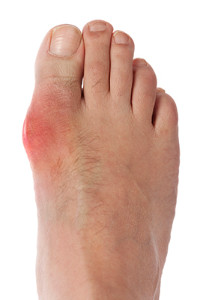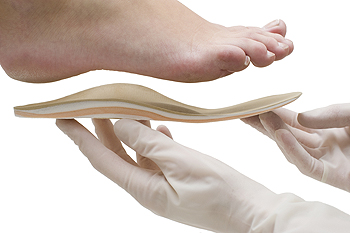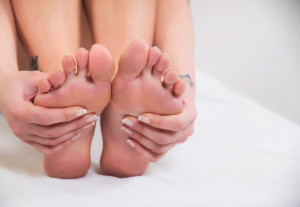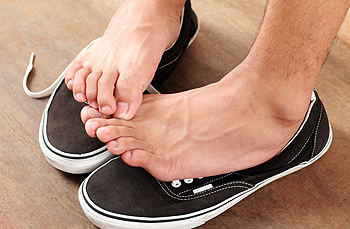How Do I Know if I Have Gout?
 The general cause of a condition referred to as gout is an excess of uric acid that accumulates in the body. The big toe is typically affected, and obvious symptoms may include intense pain, swelling, and redness in the surrounding areas. It will often appear as an inflamed protrusion on the side of the big toe, and may affect the ability to walk. Research has shown that it may be a controllable condition and may occur because of the foods that are ingested. There may be several items that may fall into this category, including the consumption of red meat, an excessive salty foods, and any type of shellfish. Drinking excess alcohol may also lead to the development of gout, in addition to a family history of high blood pressure. Occasionally, there may be specific medical conditions in which the body has difficulty eliminating uric acid, such as kidney or thyroid ailments. The treatment for gout can vary, so it’s advised to consult with a podiatrist for a proper diagnosis.
The general cause of a condition referred to as gout is an excess of uric acid that accumulates in the body. The big toe is typically affected, and obvious symptoms may include intense pain, swelling, and redness in the surrounding areas. It will often appear as an inflamed protrusion on the side of the big toe, and may affect the ability to walk. Research has shown that it may be a controllable condition and may occur because of the foods that are ingested. There may be several items that may fall into this category, including the consumption of red meat, an excessive salty foods, and any type of shellfish. Drinking excess alcohol may also lead to the development of gout, in addition to a family history of high blood pressure. Occasionally, there may be specific medical conditions in which the body has difficulty eliminating uric acid, such as kidney or thyroid ailments. The treatment for gout can vary, so it’s advised to consult with a podiatrist for a proper diagnosis.
Gout is a painful condition that can be treated. If you are seeking treatment, contact Dr. Steven Shlonsky from Louisville, Kentucky. Dr. Shlonsky will treat your foot and ankle needs.
What Is Gout?
Gout is a form of arthritis that is characterized by sudden, severe attacks of pain, redness, and tenderness in the joints. The condition usually affects the joint at the base of the big toe. A gout attack can occur at any random time, such as the middle of the night while you are asleep.
Symptoms
- Intense Joint Pain - Usually around the large joint of your big toe, and it most severe within the first four to twelve hours
- Lingering Discomfort - Joint discomfort may last from a few days to a few weeks
- Inflammation and Redness -Affected joints may become swollen, tender, warm and red
- Limited Range of Motion - May experience a decrease in joint mobility
Risk Factors
- Genetics - If family members have gout, you’re more likely to have it
- Medications - Diuretic medications can raise uric acid levels
- Gender/Age - Gout is more common in men until the age of 60. It is believed that estrogen protects women until that point
- Diet - Eating red meat and shellfish increases your risk
- Alcohol - Having more than two alcoholic drinks per day increases your risk
- Obesity - Obese people are at a higher risk for gout
Prior to visiting your podiatrist to receive treatment for gout, there are a few things you should do beforehand. If you have gout you should write down your symptoms--including when they started and how often you experience them, important medical information you may have, and any questions you may have. Writing down these three things will help your podiatrist in assessing your specific situation so that he or she may provide the best route of treatment for you.
If you have any questions, please feel free to contact our office located in Louisville, KY . We offer the newest diagnostic and treatment technologies for all your foot care needs.
What is the Most Common Place for Falls to Occur?
 If you should experience a fall, it may not only produce physical distress, but can also incur extreme financial costs. Severe injuries may be the result of a fall, and this may aid in the rise of unwanted medical expenses. Unnatural feelings can be produced by falling, and research has shown there are several ways to prevent this from occurring. It’s important to wear shoes that fit correctly, and having slip-resistance soles may aid in the prevention of falls. Unsurprisingly, the environment in the home may account for the majority of falls occurring. This generally results from carpets that may have loosened from the floor or liquids that may have spill, causing the floor to become slippery. It’s important to use a railing while walking up or down the stairs, and utilizing a handrail in the shower may be beneficial in keeping your balance. Incorporating exercise into your daily routine will strengthen the body and may possibly help avoid falling.
If you should experience a fall, it may not only produce physical distress, but can also incur extreme financial costs. Severe injuries may be the result of a fall, and this may aid in the rise of unwanted medical expenses. Unnatural feelings can be produced by falling, and research has shown there are several ways to prevent this from occurring. It’s important to wear shoes that fit correctly, and having slip-resistance soles may aid in the prevention of falls. Unsurprisingly, the environment in the home may account for the majority of falls occurring. This generally results from carpets that may have loosened from the floor or liquids that may have spill, causing the floor to become slippery. It’s important to use a railing while walking up or down the stairs, and utilizing a handrail in the shower may be beneficial in keeping your balance. Incorporating exercise into your daily routine will strengthen the body and may possibly help avoid falling.
Preventing falls among the elderly is very important. If you are older and have fallen or fear that you are prone to falling, consult with Dr. Steven Shlonsky from Louisville, Kentucky. Dr. Shlonsky will assess your condition and provide you with quality advice and care.
Every 11 seconds, an elderly American is being treated in an emergency room for a fall related injury. Falls are the leading cause of head and hip injuries for those 65 and older. Due to decreases in strength, balance, senses, and lack of awareness, elderly persons are very susceptible to falling. Thankfully, there are a number of things older persons can do to prevent falls.
How to Prevent Falls
Some effective methods that older persons can do to prevent falls include:
- Enrolling in strength and balance exercise program to increase balance and strength
- Periodically having your sight and hearing checked
- Discuss any medications you have with a doctor to see if it increases the risk of falling
- Clearing the house of falling hazards and installing devices like grab bars and railings
- Utilizing a walker or cane
- Wearing shoes that provide good support and cushioning
- Talking to family members about falling and increasing awareness
Falling can be a traumatic and embarrassing experience for elderly persons; this can make them less willing to leave the house, and less willing to talk to someone about their fears of falling. Doing such things, however, will increase the likelihood of tripping or losing one’s balance. Knowing the causes of falling and how to prevent them is the best way to mitigate the risk of serious injury.
If you have any questions, please feel free to contact our office located in Louisville, KY . We offer the newest diagnostic and treatment technologies for all your foot care needs.
What are Orthotics?
 Corrective inserts that are designed to be used in shoes are often referred to as orthotics. There are several benefits to using orthotics, including providing comfort, stability, and additional support that the foot may need. They are typically used to correct certain foot abnormalities, including high arches, flat feet, or foot structures that may originate from a predisposed inherited gene. They are generally constructed of materials designed for the specific foot issue, which may be a high arch or specific heel injuries. If you have foot pain, there is a chance that orthotics may work for you. A podiatrist will be able to ascertain if orthotics are needed for your foot condition.
Corrective inserts that are designed to be used in shoes are often referred to as orthotics. There are several benefits to using orthotics, including providing comfort, stability, and additional support that the foot may need. They are typically used to correct certain foot abnormalities, including high arches, flat feet, or foot structures that may originate from a predisposed inherited gene. They are generally constructed of materials designed for the specific foot issue, which may be a high arch or specific heel injuries. If you have foot pain, there is a chance that orthotics may work for you. A podiatrist will be able to ascertain if orthotics are needed for your foot condition.
If you are having discomfort in your feet and would like to try orthotics, contact Dr. Steven Shlonsky from Louisville, Kentucky. Dr. Shlonsky can provide the care you need to keep you pain-free and on your feet.
What Are Orthotics?
Orthotics are inserts you can place into your shoes to help with a variety of foot problems such as flat feet or foot pain. Orthotics provide relief and comfort for minor foot and heel pain but can’t correct serious biomechanical problems in your feet.
Over-the-Counter Inserts
Orthotics come in a wide variety of over-the-counter inserts that are used to treat foot pain, heel pain, and minor problems. For example, arch supports can be inserted into your shoes to help correct overarched or flat feet, while gel insoles are often used because they provide comfort and relief from foot and heel pain by alleviating pressure.
Prescription Orthotics
If over-the-counter inserts don’t work for you or if you have a more severe foot concern, it is possible to have your podiatrist prescribe custom orthotics. These high-quality inserts are designed to treat problems such as abnormal motion, plantar fasciitis, and severe forms of heel pain. They can even be used to help patients suffering from diabetes by treating foot ulcers and painful calluses and are usually molded to your feet individually, which allows them to provide full support and comfort.
If you are experiencing minor to severe foot or heel pain, it’s recommended to speak with your podiatrist about the possibilities of using orthotics. A podiatrist can determine which type of orthotic is right for you and allow you to take the first steps towards being pain-free.
If you have any questions please contact our office located in Louisville, KY . We offer the newest diagnostic and treatment technologies for all your foot and ankle needs.
Why Are Foot Stretches Important?
 The importance of properly stretching the feet aids in the body’s ability to maintain balance. Additional benefits include developing flexibility and limber muscles, which can possibly help one avoid Achilles tendon injuries and heel pain. As the feet become stronger, the likelihood of pain in the arches and tears in the tendons will diminish. Pointing and flexing the feet is a simple yet effective stretch for the entire foot, which allows the ankles to strengthen. When pointing your toes, it’s suggested to strive for a feeling of the top of the arch becoming longer, which results in toe movement from the muscles that are stretched under the arch. If you would like additional information about the importance of proper foot stretches and techniques, please schedule a consultation with a podiatrist.
The importance of properly stretching the feet aids in the body’s ability to maintain balance. Additional benefits include developing flexibility and limber muscles, which can possibly help one avoid Achilles tendon injuries and heel pain. As the feet become stronger, the likelihood of pain in the arches and tears in the tendons will diminish. Pointing and flexing the feet is a simple yet effective stretch for the entire foot, which allows the ankles to strengthen. When pointing your toes, it’s suggested to strive for a feeling of the top of the arch becoming longer, which results in toe movement from the muscles that are stretched under the arch. If you would like additional information about the importance of proper foot stretches and techniques, please schedule a consultation with a podiatrist.
Stretching the feet is a great way to prevent injuries. If you have any concerns with your feet consult with Dr. Steven Shlonsky from Louisville, Kentucky. Dr. Shlonsky will assess your condition and provide you with quality foot and ankle treatment.
Stretching the Feet
Being the backbone of the body, the feet carry your entire weight and can easily become overexerted, causing cramps and pain. As with any body part, stretching your feet can serve many benefits. From increasing flexibility to even providing some pain relief, be sure to give your feet a stretch from time to time. This is especially important for athletes or anyone performing aerobic exercises, but anyone experiencing foot pain or is on their feet constantly should also engage in this practice.
Great ways to stretch your feet:
- Crossing one leg over the others and carefully pull your toes back. Do 10-20 repetitions and repeat the process for each foot
- Face a wall with your arms out and hands flat against the wall. Step back with one foot and keep it flat on the floor while moving the other leg forward. Lean towards the wall until you feel a stretch. Hold for 30 seconds and perform 10 repetitions for each foot
- Be sure not to overextend or push your limbs too hard or you could risk pulling or straining your muscle
Individuals who tend to their feet by regular stretching every day should be able to minimize foot pain and prevent new problems from arising.
If you have any questions, please feel free to contact our office located in Louisville, KY . We offer the newest diagnostic and treatment technologies for all your foot care needs.
Are the Feet Affected by Obesity?
Recent research has suggested there’s a strong connection between obesity and medical concerns involving the feet and ankles. Typically, the additional weight may alter the structure of the foot, allowing ailments such as plantar fasciitis, tendinitis, and fallen arches to occur. These conditions affect the feet, which can hinder the daily routine and activities. Additional consequences may include the onset of type 2 diabetes, which affects the ability to heal properly. Neuropathy may develop, which is the inability to feel pain due to nerve damage occurring, and any cuts in the skin may take longer to heal. If you are suffering from any of these ailments please consider a consultation with a podiatrist for any foot conditions that need to be addressed.
Obesity has become very problematic at this point in time and can have extremely negative effects on the feet. If you’re an obese individual and are concerned about your feet, contact Dr. Steven Shlonsky from Louisville, Kentucky. Dr. Shlonsky can provide the care you need to keep you pain-free and on your feet.
Obesity and Your Feet
Since your feet are what support your entire weight when standing, any additional weight can result in pain and swelling. Being overweight is one of the main contributors to foot complications.
Problems & Complications
Extra Weight – Even putting on just a few extra pounds could create serious complications for your feet. As your weight increases, your balance and body will shift, creating new stresses on your feet. This uneven weight distribution can cause pain, even while doing the simplest tasks, such as walking.
Diabetes – People who are overweight are at serious risk of developing type-2 diabetes, which has a drastic impact on the health of your feet. As you get older, your diabetes might worsen, which could lead to loss of feeling in your feet, sores, and bruises. You could also become more prone to various infections.
Plantar fasciitis – Pressure and stress that is placed on muscles, joints, and tendons can trigger plantar fasciitis, which is an inflammation of tissue that forms along the bottom of the foot.
If you have any questions please feel free to contact our office located in Louisville, KY . We offer the newest diagnostic and treatment technologies for all your foot and ankle needs.








